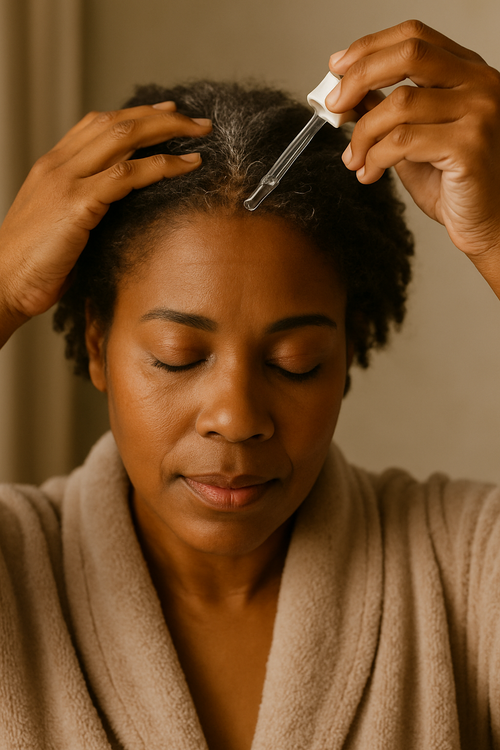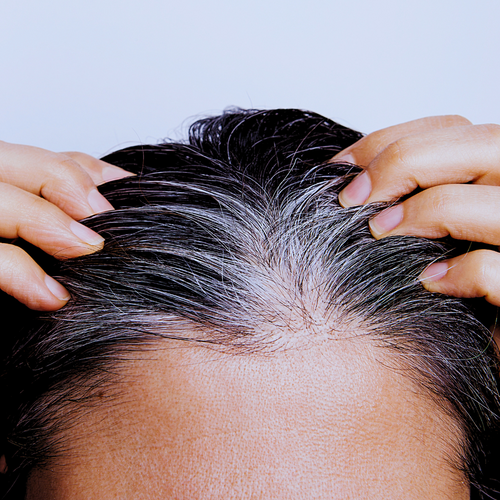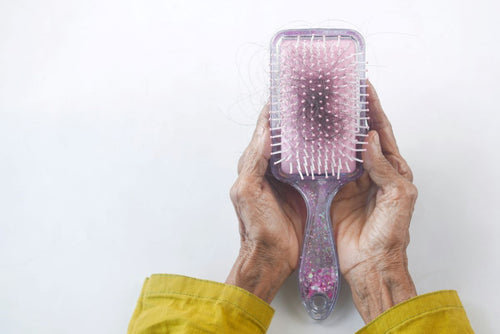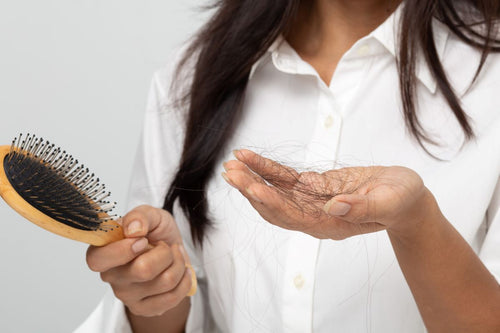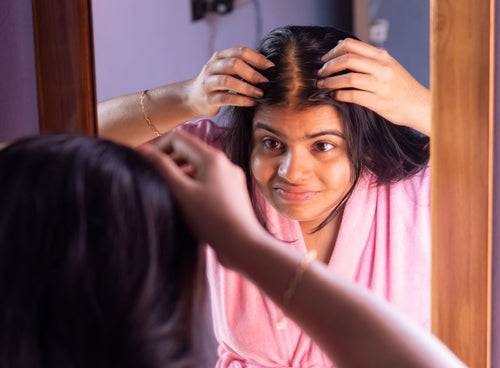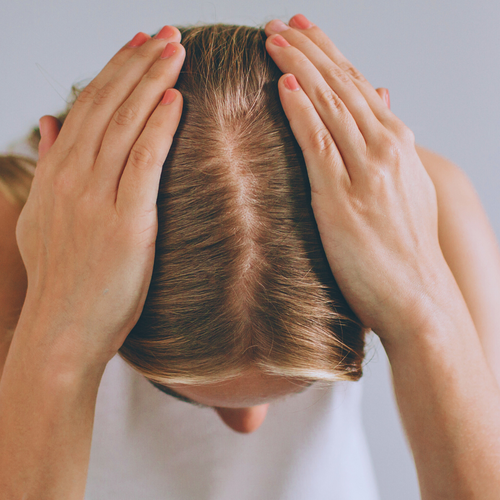Stress is a part of life, but when it starts affecting your health—especially your hair—it’s time to pay attention. Hair loss due to stress is more common than you might think, but the silver lining is that it’s usually reversible. In this article, we'll explore the connection between stress and hair loss, break down the different types of stress-related hair loss, and discuss practical methods to help you regain your hair.
Can Stress Cause Hair Loss?
Understanding the Link Between Stress and Hair Loss
The short answer is yes, stress can definitely cause hair loss. When your body is under stress—whether it’s emotional, physical, or psychological—it can disrupt the natural hair growth cycle. Normally, hair goes through three stages: the growth phase (anagen), the transition phase (catagen), and the resting phase (telogen). But when stress hits, it can push a lot more hair into the telogen phase prematurely, leading to increased shedding.
The Science Behind Stress-Induced Hair Loss
The most common type of hair loss linked to stress is called Telogen Effluvium. In this condition, a significant number of hair follicles are pushed into the resting phase all at once, leading to noticeable shedding. Under normal conditions, about 85-90% of your hair is in the growth phase, with only a small percentage resting. But when stress throws a wrench into the works, this balance is disturbed, and you see more hair on your pillow, in the shower drain, and even in your comb.
Why Does Stress Cause Hair Loss?
The Body’s Response to Stress
When you’re stressed, your body produces more of the hormone cortisol—often called the stress hormone. While cortisol is essential for managing stress in the short term, consistently high levels can wreak havoc on various bodily functions, including hair growth. Elevated cortisol can interfere with the functioning of hair follicles, pushing them prematurely into the resting phase and causing hair to fall out.
The Role of Inflammation in Stress-Related Hair Loss
Stress often leads to chronic inflammation in the body, which can negatively impact your hair follicles. Inflammation can restrict the flow of essential nutrients to the hair follicles, weakening them and making them more prone to shedding. This inflammation can also extend the resting phase of the hair growth cycle, slowing down the regrowth process.
Types of Stress-Induced Hair Loss
Telogen Effluvium
Telogen Effluvium is the most common type of hair loss caused by stress. It occurs when a large number of hair follicles enter the resting phase prematurely, leading to widespread hair shedding. This type of hair loss usually results in diffuse thinning across the scalp rather than bald spots, which can make it harder to notice at first.
Alopecia Areata
Alopecia Areata is a more severe form of hair loss that can be triggered by stress. This autoimmune condition causes the body’s immune system to mistakenly attack hair follicles, leading to round patches of hair loss. In some cases, it can progress to complete baldness on the scalp or even the entire body, though this is less common.
Trichotillomania
Trichotillomania is a stress-related impulse control disorder where individuals feel an overwhelming urge to pull out their own hair. This can lead to noticeable bald patches and significant hair loss. It’s often a coping mechanism for dealing with intense stress or anxiety, but it can have serious consequences for your hair and scalp health.
How Do I Know If My Hair Loss Is from Stress?
Identifying Stress-Related Hair Loss
Determining whether your hair loss is due to stress can be tricky, especially since there are many potential causes of hair thinning and shedding. However, if your hair loss coincides with periods of significant stress—whether it’s emotional, physical, or psychological—it’s likely stress-related. Think back to the last few months. Have you gone through a particularly tough time? If so, your hair might just be reacting to it.
Consulting a Dermatologist
If you’re not sure whether stress is the culprit, it’s always a good idea to consult a dermatologist. They can perform a thorough scalp examination, review your medical history, and run tests to rule out other potential causes, such as hormonal imbalances, nutritional deficiencies, or underlying health conditions. Getting a professional opinion can give you peace of mind and help you find the right treatment plan.

What Are the Signs of Hair Loss Due to Stress?
Common Symptoms of Stress-Induced Hair Loss
- Increased Shedding: One of the most obvious signs of stress-related hair loss is seeing more hair in your brush, on your pillow, or in the shower drain. If you’re noticing clumps of hair coming out, it might be time to consider whether stress is playing a role.
- Diffuse Thinning: Stress-related hair loss often leads to diffuse thinning, where your hair becomes thinner across the entire scalp, rather than in specific spots. This can make your hair look less voluminous and may even expose more of your scalp.
- Patchy Hair Loss: In cases of alopecia areata, you might notice round, bald patches on your scalp or other areas of your body. This type of hair loss can be alarming, but it’s important to remember that it’s often temporary.
- Slower Hair Growth: Stress doesn’t just cause hair to fall out—it can also slow down the hair growth process. If your hair seems to be taking forever to grow back after shedding, stress might be the reason.
How to Regain Hair Loss from Stress
Medical Treatments for Stress-Induced Hair Loss
Regaining hair lost due to stress is possible, and there are several medical treatments that can help:
- Minoxidil: This over-the-counter topical treatment is well-known for stimulating hair growth. It’s often used to treat telogen effluvium and other types of hair loss by prolonging the growth phase of the hair cycle.
- Corticosteroids: These are usually prescribed for more severe cases, like alopecia areata. Corticosteroids work by reducing inflammation and suppressing the immune response that’s attacking your hair follicles, giving your hair a chance to regrow.
- Platelet-Rich Plasma (PRP) Therapy: PRP therapy involves drawing a small amount of your blood, processing it to concentrate the platelets, and then injecting it into your scalp. This treatment can stimulate hair follicles and promote regrowth by using your body’s own healing processes.

Natural Remedies and Lifestyle Changes
In addition to medical treatments, there are several natural remedies and lifestyle changes you can try to regain hair lost due to stress:
- Stress Management: One of the most effective ways to combat stress-related hair loss is to manage your stress levels. Incorporating stress management techniques such as meditation, yoga, deep breathing exercises, and mindfulness can help lower your cortisol levels, reduce inflammation, and promote hair regrowth.
- Balanced Diet: Your hair needs proper nutrition to grow strong and healthy. Make sure your diet is rich in vitamins and minerals essential for hair health, like biotin, zinc, iron, and vitamins A, C, D, and E. A balanced diet can give your hair the building blocks it needs to recover.
- Scalp Massage: Regular scalp massages can increase blood circulation to your hair follicles, promoting healthier hair growth. You can use your fingers or a special scalp massager to gently stimulate your scalp for a few minutes each day.
- Supplements: If you are deficient, consider adding hair-supporting supplements to your routine. Biotin, vitamin D, omega-3 fatty acids, and other hair-friendly nutrients can help nourish your hair from the inside out.

Adaptogenic Herbs and Supplements
Adaptogens are herbs that help your body adapt to stress, making them a valuable tool in combating stress-induced hair loss. Some adaptogens that can support hair health include:
- Ashwagandha: This powerful herb is known for its ability to lower cortisol levels and help your body cope with stress. By reducing stress, ashwagandha can also help protect your hair from the negative effects of stress.
- Rhodiola Rosea: Rhodiola Rosea is an adaptogen that helps reduce fatigue and improves your body’s resistance to stress. It can help keep your hair healthy by preventing stress from taking a toll on your body.
- Holy Basil: Also known as Tulsi, Holy Basil supports your body’s response to stress and promotes overall well-being. It can be taken as a supplement or brewed into a tea for a soothing, stress-relieving drink.
Adaptogenic Scalp Serum
For those looking for a targeted solution to stress-induced hair loss, Revita+Fol adaptogenic scalp serum is a must-try. Crafted with a unique blend of adaptogenic herbs, bioactive botanicals, and stress-reducing ingredients that nourish the scalp and strengthen hair follicles. This luxurious serum not only helps protect your hair from stress but also supports healthy hair growth, giving you back the thick, luscious locks you love.
How Long Will It Take for Hair to Grow Back?
The Hair Growth Timeline
Regrowing hair after stress-induced hair loss is possible, but it takes time and patience. Typically, once the underlying stress is managed, you may start to see new hair growth within 3 to 6 months. However, the complete restoration of hair thickness and volume can take anywhere from 6 to 12 months or even longer, depending on the severity of the hair loss and how well your body responds to treatment.
Factors Affecting Hair Regrowth
- Severity of Hair Loss: If your hair loss was mild, you might see regrowth sooner. On the other hand, more severe cases, such as those involving alopecia areata, may take longer to recover.
- Your Overall Health: A healthy body supports healthy hair. Ensuring you’re in good physical condition, with a balanced diet, regular exercise, and proper sleep, can speed up the regrowth process.
- Treatment and Care: Consistently using recommended treatments can significantly improve your chances of regrowing hair faster. Combining these treatments with stress management techniques will yield the best results.
When to Seek Help
If you don’t see any improvement in your hair loss, or if the condition worsens, it may be time to seek further medical advice. A dermatologist can reassess your situation, potentially recommending more advanced treatments like PRP therapy or exploring other underlying causes that may need to be addressed.
FAQs: Regaining Hair Loss from Stress
Can stress-induced hair loss be permanent?
Stress-induced hair loss is usually not permanent. Most people experience temporary hair loss, and with proper treatment and stress management, their hair can grow back. However, prolonged stress and lack of intervention may make it harder to regain full hair density.
Can stress-related hair loss happen overnight?
While stress can trigger hair loss, it usually doesn’t happen overnight. Stress-induced hair loss typically occurs several weeks to months after a significant stressor, as hair follicles take time to enter the resting phase and eventually shed.
How can I prevent stress-induced hair loss in the future?
Preventing stress-induced hair loss involves managing your stress levels consistently. Incorporating stress-relief practices into your daily routine, maintaining a healthy diet, and using supportive anti-stress products can help protect your hair from future stress-related shedding.
Are there specific foods that help with stress-related hair loss?
Yes, certain foods can support hair health and help combat stress-related hair loss. Foods rich in vitamins and minerals such as spinach (iron), eggs (biotin), fatty fish (omega-3 fatty acids), and nuts (vitamin E) are excellent for promoting healthy hair growth.
Takeaway
In conclusion, hair loss from stress can be distressing, but with the right approach, it is possible to regain your hair and restore its health. By managing your stress, using effective treatments, and incorporating adaptogenic formulas you can support your hair’s recovery journey. Remember, patience is key, and with time, care, and consistency, you’ll see those strands return.




